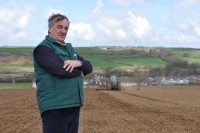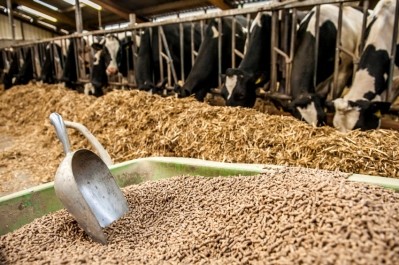UK feed group underplays impact of Brexit

The company reported “robust” financials for the six months up to 30 April 2016 that were “in line with management expectations."
“We had reasonably good results considering the climate we are operating it. We had already flagged up earlier this year that the current environment, with low farmgate prices for the second year running, was going to affect our business,” Wynnstay CEO, Ken Greetham, told FeedNavigator this morning.
Revenue came in at £193.2m ($260m), down from £200.6m in 2015 – the group said this 3.6% year on year (YoY) dip reflected continuing commodity price deflation, which cut earnings by around £20m, as well as lower volumes of manufactured feed, particularly dairy, products. Wynnstay also registered a pre-tax profit of £4.08m [2015: £4.82m].
UK animal feed production figures from the Department of the Environment, Food and Rural Affairs (DEFRA) showed that during Wynnstay’s results period, November 2015 to April 2016, overall UK ruminant feed production fell 3.6% YoY.
But Greetham believes that Wynnstay, which produces feed for the dairy and layers segments, remains positioned to achieve its targets for the financial year:
"Our diversification model is strong; our broad spread of activities from feed to arable to retail, all intrinsically linked, provides resilience against current headwinds," said the CEO.
He said the group had no plans to diversify further: "Our feed business is robust, and we have no interest in moving into other segments such as the broiler market."
Brexit fallout
While saying a recovery in prices for UK dairy farmers was difficult to predict and also depends on the dynamics of the global market, Greetham was not downbeat about the consequences of the UK voting to leave the EU:
“In terms of replacement for EU subsidies post Brexit, we see that, from the farming and agricultural industry point of view, there will, of course, be UK government support, given the the sector's strategic importance, along with the importance of the wider rural economy.
“The UK agriculture industry is at 59% self-sufficiency, the goal is to get that up to around 70%.
“We are confident about the sector in the medium to long term while remaining keenly aware of the current constraints on the market,” said the CEO.
But he did not rule out a hike in the cost of animal feed raw material and grain imports based on a weaker pound. “And there is a limit to how much farmers can afford to pay,” added Greetham.

The broker perspective:
And UK based brokers, VSA Capital, commenting on Wynnstay’s results yesterday, questioned how supportive UK government agriculture payments would be compared to the existing EU system.
The analysts, while also downplaying the short-term impact of Brexit, flagged up the fact there will likely be general business uncertainty for the next two years, and that this could impact both share prices and underlying customer decisions.
They also noted costs of some imported feed raw materials, while perhaps getting more expensive with a weaker pound, could largely be passed on to customers. “Should the pound strengthen, perhaps as the EU started to unravel further, this would of course be reversed,” added the VSA analysts.
Efficiency gains
Commenting further, Greetham said there is no doubt that greater efficiencies across the UK agriculture industry could make it more robust:
“The UK farming and feed sector is no less efficient than anywhere else but there is room for improvement.
“Streamlining logistics, for example, could take out some of the costs. We are conscious of the fact that we daily come in contact with other businesses transporting their feed loads – perhaps there could be a way to optimize haulage, could we work together on this, I don’t know, but that is one area with considerable inefficiencies,” he said.
Wynnstay is planning to invest in its feed mills with plans underway for a new bagging facility which will support distribution to its network of retail stores. “We are also expanding our milling operations in Wales,” said Greetham.









